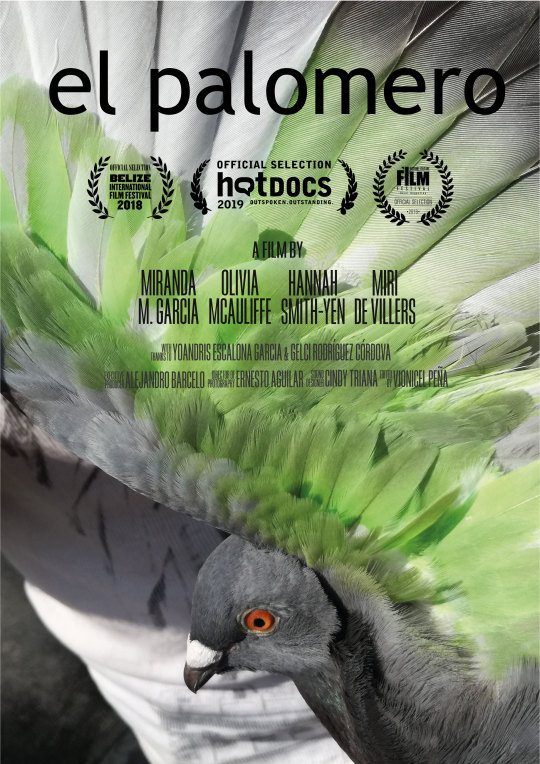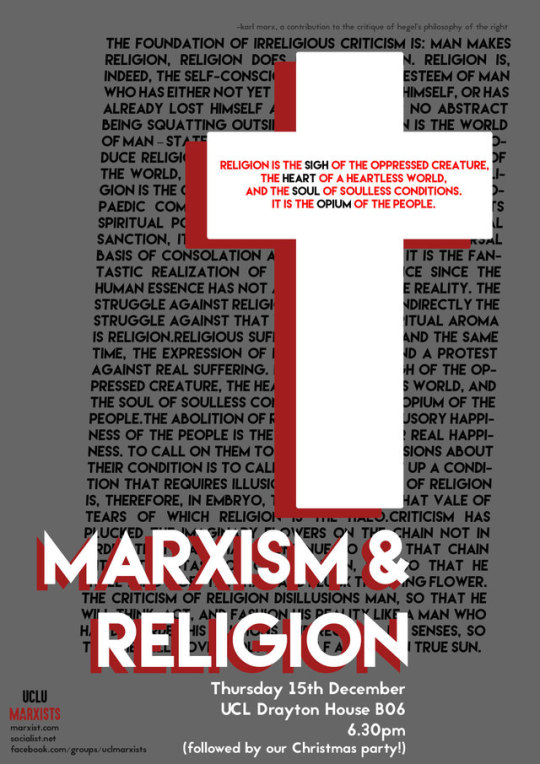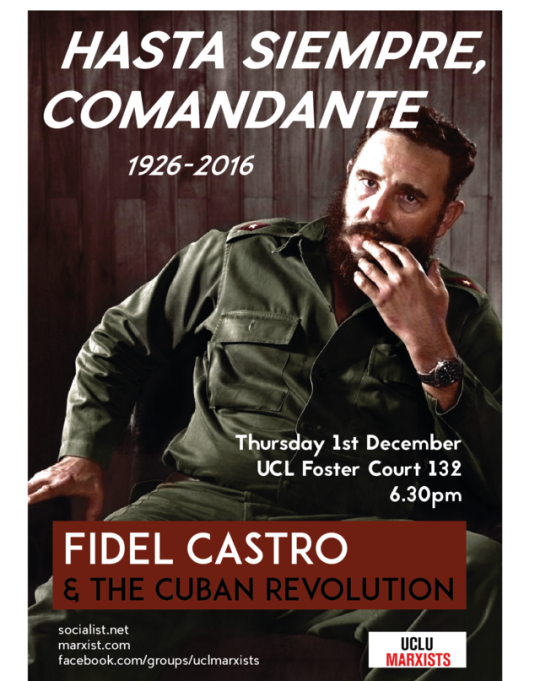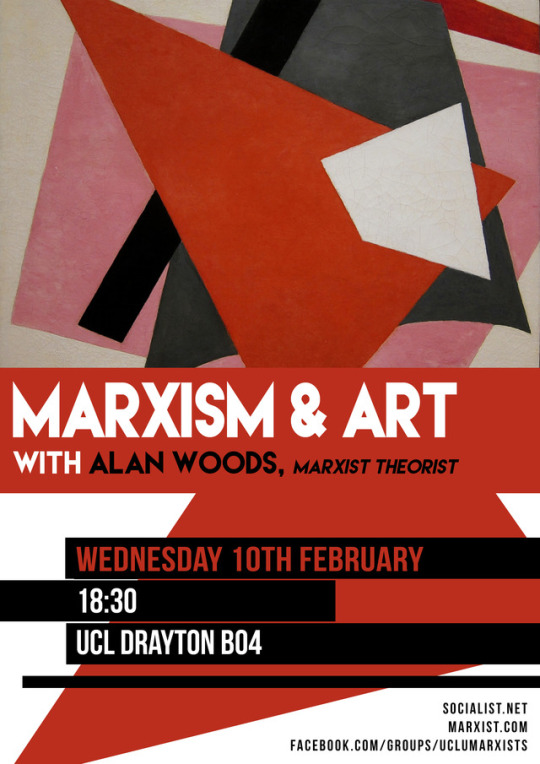Don't wanna be here? Send us removal request.
Photo
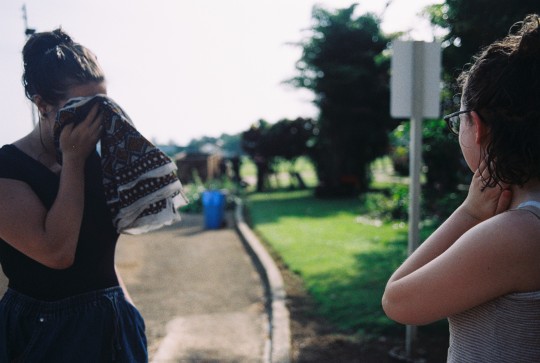
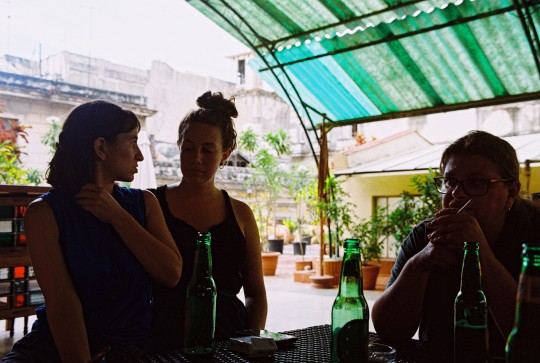
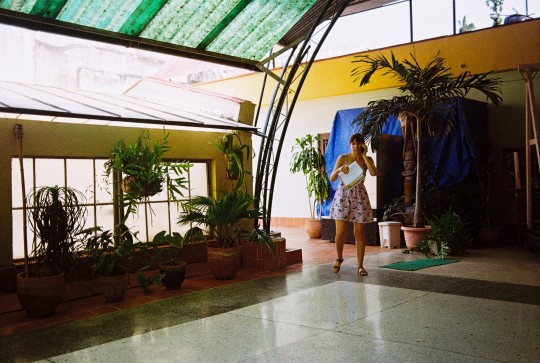

San Antonio de los Baños & Havana, Summer 2018.
2 notes
·
View notes
Text
Affordances and Sociality in RuneScape
An academic blog post written for a module exploring gaming, during my anthropology degree.
RuneScape is a massively multiplayer online role playing game set in a medieval fantasy world. New players name and customise an avatar to represent them in-game. There are a variety of activities on offer: players can engage in combat, mine, steal, cook, fish, pray, and trade, among many other options. Interaction with other players is possible by clicking on them (for options including trading and duelling) or speaking to them in public/private chat channels. It is both collaborative and competitive. I played mostly by myself but at times my brother, who played it years ago, joined me (both in-person and in-game).
The game begins in a tutorial area that teaches you some of the mechanics of the game through directing you to complete actions. You learn how to mine, cook, fish, light fires, and engage in combat, as well as basic avatar and camera movement. After this, you are directed to leave the tutorial area and embark upon your first quest, in which you receive the base weapons of the game. RuneScape gave me the distinct impression that a more combat-focused playstyle was meant to be the ‘right’ way to play, in that game prompts directed me to complete combat challenges first and complete combat-based quests – until I checked the wiki, I was not fully sure whether there were non-combat quests. I completed some of the initial quests but soon decided to focus on exploring the other ways to play as I found the combat sluggish and dull, and the movement system unresponsive and slow. My brother had played RuneScape years ago and he told me he followed a similar path in that soon after joining he decided that it would be more interesting to see how wealthy he would be able to become in-game rather than focus on levelling up combat skills. I predominantly focused on trading at the Grand Exchange and crafting-related activities.
I found that, for an MMO, RuneScape was in some respects curiously un-social. For example, an affordance such as automated trading via the Grand Exchange greatly lessens the need to directly trade between players (which requires some level of social interaction) simply because it is more convenient, and it is possible to get better prices for your goods as the price does not have to be filtered through the lens of social relations. This arguably negatively affects RuneScape’s social community as trading between players is often considered important for the establishment and maintenance of social bonds, and this loss can represent a push towards solo play over social play (Crenshaw & Nardi 2016).
Throughout my time playing, I received one request to trade from another player, and it was quickly cancelled as presumably they had only mistakenly clicked that option. Every other transaction I engaged in went through the Grand Exchange – you list items, set a price, then continue about your day until an unnamed player buys your item. It is possible to play for hours without speaking to a single person or witnessing a single public conversation. Furthermore, while I’m sure that with time I would be able to differentiate between NPCs and player avatars on sight, the fact that they are not labelled distinctly contributed to the somewhat deserted atmosphere of the world as it meant everyone appeared on first glance to be an NPC. This was in part due to the fact that my server was quite empty, as the below conversation illustrates (usernames changed for anonymity).
kats: Omg what happened to world 108, only 170 people?
smj: I think you mean what happened to rs
kats: Yeah well, you"re not wrong but, still aha
smj : Does anyone actually play this legitimately f2p?
kats: Hey, I'm guilty right now lol
smj : Just out of bonds or?
kats: I don't play enough to get membership tbh
smj : Yeah fair enough
kats: Wbu? Just ran out of bonds?
smj : Na cbf after I compd, mems ran out like yesterday
smj : No more goals
kats: :( maybe play some old school runescape
smj : Dont think I could go through ita ll again haha, otherwise i would
kats: Im exactly the same hey
smj : Anyway got a queue pop on cs, cya later
kats: Okay,cya later
The lack of players is viewed by both as a RuneScape-wide problem. This conversation brings up multiple affordances – the ability to buy membership, the split into different worlds, and the non-transferability of accounts between RuneScape and Old School RuneScape (OSRS). OSRS was originally an exact copy of the 2007 version of RuneScape, but has since differentiated itself through engine improvements and added content. It has over twice the active players of RuneScape (Anon 2018). OSRS is a modernised version of past Runescape, but that past is rendered inaccessible to either player unless they choose to abandon their avatar’s life history and start anew. In a sense, they are caught in an endless present – neither seem to see much of a future in RuneScape (as neither of them feel it is worth it to buy membership again, though they continue to play) but they are unable to revisit the ‘past’ by continuing their existing RuneScape life in OSRS.
The reason that 'smj’ brings up playing RuneScape ‘f2p’, free-to-play, is because RuneScape worlds are restricted by membership status and I was playing on a non-member world, which requires no fee. There are currently more member worlds than non-member and players must therefore pay to access the wider social community. Presumably the more committed players will buy membership, meaning that the free-to-play areas are more akin to stepping stones to a greater commitment and a more permanent community, rather than fully realised worlds unto themselves. For an MMO, sociality is an essential part of what ties players to the game (Taylor 2006), and so the quiet, empty, F2P world creates a play experience that is fundamentally more transient and less consequential. This is perhaps supported by the fact that 'smj’ leaves the conversation to play ‘cs’ (from context I assume this is Counterstrike: Global Offensive, though I cannot be sure) indicating that RuneScape occupies a less important place in their life.
An additional affordance related to membership is the existence of items (often awarded as prizes) that can only be used in members-only worlds. These function as a frequent reminder of non-member status and of the in-game benefits of membership, continually underscoring the experience of play with the knowledge that becoming a member would make it even better. The items take up space within the inventory and cannot be sold or banked, only destroyed. This was incredibly frustrating to experience – it means that non-paying players are forced by the game to specifically choose to destroy valuable items, turning them into active participants in the enactment of their own non-member status.
This frustration continued with the realisation that there are level caps for certain skills in the F2P worlds. The format of the free game with paid memberships essentially creates “one game, two experiences” (Lin & Sun 2011:276) where poorer players will always be at a disadvantage, and at times it felt as if RuneScape was essentially punishing me for choosing not to buy membership. The continual, assertive emphasis on purchasing membership represents the invasion of the market and material interests into the game, and therefore the blurring of the boundaries between the ‘real world’ and the limited space that characterises play (Huizinga 1970). This damages immersion into the online world and arguably lessens enjoyment of RuneScape.
With regards to the affordances for learning, RuneScape’s tutorial and in-game prompts offered very little guidance on massively important aspects of the game such as switching between servers, navigating the landscape, interacting with other players, and trading. I was not aware that it was even possible to play different worlds until I had written most of this post. While this might be argued to be a way to push new players to ask others for help and thus to encourage the formation of social relationships, because of the low player population on the server this meant that in practice the early periods of gameplay were simply confusing. When I mentioned this to my brother, he replied, “Oh yeah, you kind of just have to figure it out. It’s not an intuitive game.”
If there is no longer any real community in the F2P sections of RuneScape to implicitly relay social rules to new players, the informational gaps in the tutorial phase and the lack of actively pro-social affordances within the game are exposed. It is difficult for a new player to internalise and acculturate themselves into the social world of RuneScape with neither a player community to observe and imitate, nor affordances that specifically promote the game’s forms of sociality.
Bibliography
Crenshaw, N. & Nardi, B., 2016. ‘It Was More than Just the Game, It Was the Community’: Social Affordances in Online Games. 49th Hawaii International Conference on System Sciences, pp. 3781-3790.
Lin, H. & Sun, C., 2011. Cash Trade in Free-to-Play Online Games. Games and Culture, 6(3), pp. 270-287.
Huizinga, J., 1970. Nature and Significance of Play as a Cultural Phenomenon. In: Homo Ludens: a study of the play element in culture¸ pp. 1-27. London:Maurice Temple Smith Ltd.
Taylor, T. L., 2006. Play Between Worlds: Exploring Online Game Culture. Cambridge:MIT Press.
1 note
·
View note
Text
混血儿 - thoughts on cultural identity
When I moved back to England for university, the realisation that I did not fit in was like a slap in the face - sudden and sharp and painful. I sat in a grimy university pub with the English flatmates I’d just met and listened as they laughed and complained about the smell of Asian cooking, and I didn’t say a word. They started to insult Korean food and I sat there, silent, thinking about my Korean ex-boyfriend’s mother feeding me deep fried lotus and marinated belly pork and kimchi and rice. They felt safe saying that around me because I don’t look half Asian to most people - I have an English name and an English face and an English accent. I sat there and I thought about how alone I felt with these English people who weren’t like me.
I had come to a country that was meant to be mine and it wasn’t.
I’m twenty five and the longest I’ve ever lived in one place has been seven years, in Beijing and in London. I was not born in either of these places and I have no family ties to them. My brother, Alexander, is twenty months younger than me. He moved to Manchester for university in 2017. When I spoke to him about our cultural identity, he said:
“I think it’s difficult to relate to people who grew up in England. ‘Cause they assumed that I knew all these cultural references and all this stuff. Whereas people who were from Europe, like mainland Europe, were kind of in the same boat in that they didn’t understand a lot of things that I also didn’t understand.”
The question of where someone is from often implies a single answer. But how do you look like a mixture? How are you from two or three places at once and how do you prove that? How do you resemble two sides of the family from two distant continents?
I want to understand how you can be Chinese without being Chinese, how you can be something other than what you appear, how you can be from somewhere that you’ve never lived. I’m from England, in a sense, but from an England that no longer exists. A moment in time, a childhood memory, enfolded within the space of the town. I’m from China too, but not quite.
Me: Where are you from?
“I mean, I tell people one thing but it’s not necessarily the same thing as what I feel. I usually tell people half Chinese, half English, because that’s easier. If I said, ‘Oh, I’m just Chinese’, they’re going to be like ‘Ooh, but you don’t look fully Chinese’.”
When I go out with my mother in China, there’s always a moment of surprise when she mentions I’m her daughter. One of my classmates expressed surprise when he found out I was half Taiwanese, and I asked him who he thought the Asian woman who picked me up from school was. He said that he thought she was my maid.
I’m white-passing so, though I’m ethnically half Chinese, I look white enough that most people think I’m just English. And yet, I don’t look like my English family either. I don’t have blue eyes or light hair and I’m pale but the undertones of my skin are wildly different. It’s easier for me to claim the English half of my identity but it’s hard for me to place myself within my English family specifically, because I don’t feel as if I belong. I feel the need to explain why I look a little different to any outsiders looking in.
Language, to me, is partly about proving to other people that my mixed background is legitimate. If I speak English and I look broadly English, then of course I’m allowed to say that I’m English. Who would call me out for that? To say I’m Taiwanese or Chinese, however, would require proof. For years I’ve said that once I improve my Chinese to a mostly fluent level, I’ll start learning Taiwanese. That way my mother and I will be able to gossip about people in public whenever I visit her in Shanghai. After seven years in London, my Chinese is the worst it’s ever been.
When you go to an international school, there’s not really a need to have great Chinese skills. I was good enough to ace GCSE Mandarin and I was good enough to chat to taxi drivers and get around the city, but I wasn’t good enough to say ‘I speak Chinese’ without any caveats. My brother speaks Chinese fairly well so it’s easier for him to claim that part of our identity. I feel like a fraud when I tell people I’m half Taiwanese, or that I grew up in Beijing.
Me: So, we’re siblings who grew up in the same place and we’re only 20 months apart in age but I think we’ve had very different cultural experiences.
“I think it’s somewhat to do with friend groups. I feel like a lot of your year had very good English, would you say that?”
Me: Yeah, I’d say there were more Western or Westernised kids in my year.
“Yeah, whereas my year was more mainland China culturally. You had a lot of Westernised friends, you didn’t really have the obligation to speak Chinese.”
In high school, I found my friend group in the westernised Chinese kids and my fellow 混血人 (mixed race, half blood) - too Asian for the Western kids, too Western for the Asian kids. And I think that’s the identity I feel most comfortable claiming. A non-specific Westernised identity formed out of international school culture and vague links to places abroad. We all had different accents and different birthplaces and varying levels of fluency in Chinese or Cantonese, but there was a thread of being Westernised that tied us together. I left school with a lightly Americanised English accent, an odd mix of American, English, and Chinese vocabulary, and the conviction that I was fully and completely English. Just look at my passport, if you don’t believe me.
“Passports give you better access to the world, but like, the passport doesn’t mean anything on its own, you know? Kenzo [a classmate of my brother’s] had a Gambian passport.”
Me: Really?
“Yeah. ‘Cause he just went there and like, bought a Gambian passport. But, you know, obviously he wasn’t thinking he was Gambian.”
My friend Exir, who is Chinese-Persian-American, once said to me that he felt like a cyber-age person, bits and pieces of his background stuck together like a montage. I count with my fingers like my mother taught me. I grew up eating roti in Singaporean hawker centres and goose fat noodles at my grandmother’s house in Taiwan and cheese savoury stotties from the Greggs in Sunderland city centre. My favourite drink is papaya milk.
For Chinese New Year, I make dumplings by hand, stretching and folding the wrappers around pork and cabbage filling. I fry-steam them and ask my British-French flatmate to join me in a celebratory meal, because all my friends who celebrate Chinese New Year live in Oxford or Baltimore or Montreal.
Food is one of the only areas where I feel strongly connected to my Chinese-Taiwanese side. I’ve got a rice cooker at home on the kitchen counter. My fridge is full of 老干妈 and Taiwanese satay sauce and 豆瓣酱. There are bottles of light soy sauce, dark soy sauce, sweet soy sauce, black vinegar, sesame oil lined up next to my cooking oils. There’s a shaker of MSG on the dining room table. With food, it doesn’t matter if I don’t speak Chinese or I don’t look Chinese, because I can make 卤肉饭 and 高麗菜 and 麻婆豆腐 without a recipe, the steps etched into my mind.
But food’s also a marker of difference - when I talk about eating duck blood rice, cut into squares and deep fried, then salted and seasoned and put on a stick, my English friends grimace. It’s one of my favourite night market snacks. I mention bringing back stotties from Sunderland and the southerners look at me, uncomprehending.
It’s interesting to consider the twin effects of food - connecting and dividing people. Much of Taiwanese and Chinese food is inherently social, sharing multiple dishes between you and your family or friends.
“Like when we go to see Nana, we’re not going out and having a big meal with like, Claire and Trevor and Uncle David and everything. Whereas when we go back to Taiwan, we have dinner with like, Mummy’s brother’s friend’s wife’s nephew.
When I drag my best friend to a Shanxi restaurant because I miss 肉夹馍, it feels good to share parts of my food culture with him. It’s like presenting a fuller picture of who I am. When I ask him to try my homemade 担担面, it’s a point of connection. I’m bridging the gap between who I am in China and who I am in England, consolidating the two into one. And yet, when my friends are reluctant to try deep fried oysters or 土豆絲 or tea eggs, it’s a rejection, in a sense. Food twists itself together with rejection and acceptance, connection and division, closeness and distance.
I think a lot about whose history I belong to. One of my grandfathers fled China, coming to Taiwan with the KMT army after they lost the Chinese civil war. My other grandfather was a naval architect, designing the massive vessels that sat in the Sunderland shipyards.
My father is English. He was born in Sunderland. My mother is Taiwanese. She was born in Kaohsiung. They were born in cities on the coast, linked by saltwater and sand, shipbuilding and the sea. My grandfather crossed the ocean and met my grandmother. My father crossed the ocean and met my mother. Two histories, offset but in parallel.
When I die, will anyone put my photo on the family shrine? Will they offer me food and drink and incense? Or will I become a hungry ghost, racing towards metal bins filled with ghost money set alight? Whose lineage do I belong to? I’m English and I’m Taiwanese and I’m from nowhere.
When my grandfather died, we knelt in front of his coffin and burned paper cars and watches and hell money. Sheafs of rough yellow paper imprinted with foil, burnt to ash, so he’d have money in the afterlife. A tinny speaker played Buddhist mantras on repeat endlessly. When my grandfather died, we sat in a cold church and cried. We walked to his grave under the overcast sky and my aunt put her arm around me. Then we all went to the pub.
There can be a sense of loss in growing up in a place where you’re a foreigner - it cut me off from my extended family and disconnected me from my divergent roots. It made the simple question of ‘Where are you from?’ require a response with caveats upon caveats, my birth as a point of rupture and discontinuity in the twin lineages of my two families. Identity is something I’ll have to take a more active role in than other people, to manage and shape it into something that feels right. I’ll never slot into any one country perfectly, there’ll always be gaps to fill in. I’m an uneven tangle of different cultures but that just means I’ve got places to stay and people to see whether I’m in Shanghai or Singapore or Baltimore. With the world becoming increasingly global, I’m less and less alone in having a mixed cultural identity, in not quite being from a single place. I think if you accept the discontinuity and disconnection, you can find your way to connection. I don’t have to be from one place. Over time, hopefully I’ll manage to internalise this fully.
Until then, I’ll just have to work on my Chinese.
0 notes
Photo
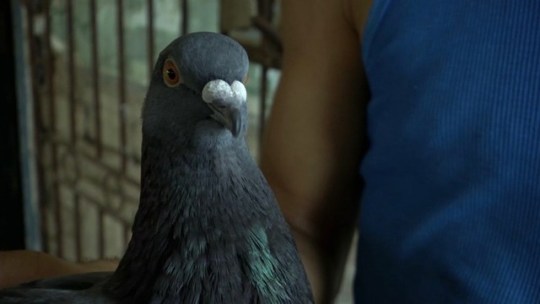

The Pigeon Keeper
Short documentary screened at Hot Docs film festival, Belize International Film Festival, Hispanic Culture Film Festival, and Fisheye Film Festival.
0 notes
Link
Poem published in Persephone’s Daughters
1 note
·
View note
Photo
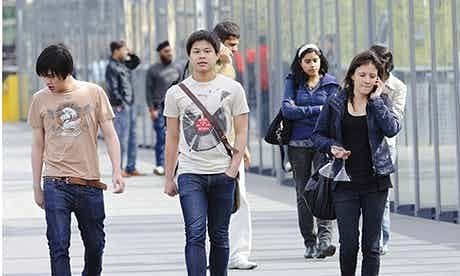
INTERNATIONAL SCHOOL STUDENTS: ROOTLESS AND WITHOUT A HOME? Post on Guardian Student Blog
0 notes
Video
vimeo
‘Observing Without Telling’, short film task from university module
0 notes
